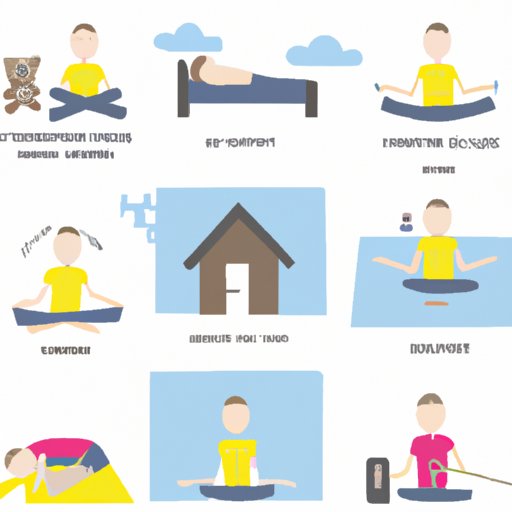Introduction
Anxiety is a common mental health issue that can have a significant impact on one’s life. It can manifest in physical symptoms such as an increased heart rate, difficulty breathing, or headaches, as well as psychological symptoms such as worry, fear, and irritability. Fortunately, there are various strategies available to help manage and reduce anxiety.
This article explores how to get rid of anxiety through exercise, mindfulness meditation, seeking professional help, getting enough sleep, and practicing relaxation techniques. By following the advice outlined in this article, you can take steps towards managing your anxiety and leading a healthier, happier life.
Exercise Regularly
Regular physical activity has been shown to be beneficial for mental health. Exercise releases endorphins, which are hormones that help reduce stress and improve mood. Additionally, research has shown that regular physical activity can reduce symptoms of anxiety.
There are many types of exercises that can be beneficial for managing anxiety. Low-impact activities such as walking, swimming, or yoga are good options for those who are just starting out. For those looking for more intense workouts, high-intensity interval training (HIIT) or weight lifting can be effective. It is important to find an activity that you enjoy and can stick with in order to reap the most benefits.
Practice Mindfulness Meditation
Mindfulness meditation is an ancient practice that involves focusing on the present moment and being aware of your thoughts, feelings, and sensations without judgment. Research has found that mindfulness meditation can help reduce symptoms of anxiety by calming the nervous system and helping to reframe anxious thoughts in a more neutral way.
Getting started with mindfulness meditation can be daunting, but it doesn’t have to be complicated. There are many free guided meditations available online that can help you learn the basics. You can also try simple breathing exercises or body scans to help you focus on the present moment. With regular practice, mindfulness meditation can become a powerful tool for managing anxiety.
Seek Professional Help
For some people, anxiety may be too severe to manage on their own. In these cases, it is important to seek professional help from a mental health practitioner such as a psychologist or psychiatrist. Mental health professionals can provide specialized treatment plans to help manage symptoms of anxiety and provide support during difficult times.
If you are looking for a mental health provider, start by asking your primary care physician for referrals. You can also search for providers in your area online. It is important to find a provider that you feel comfortable with and trust, as this will make it easier to discuss sensitive topics.
Get Enough Sleep
Sleep plays an important role in mental health. Not getting enough quality sleep can increase symptoms of anxiety and impair cognitive functioning. On the other hand, getting enough restful sleep can improve mood and reduce stress.
There are several strategies for improving sleep quality. Avoiding caffeine and alcohol before bedtime, establishing a consistent sleep schedule, and avoiding screens can help promote better sleep. If you are having trouble sleeping, talk to your doctor about potential treatments such as cognitive behavioral therapy or medication.
Practice Relaxation Techniques
Relaxation techniques involve intentionally focusing your attention on calming activities or sensations. These techniques can help reduce stress and improve mood. Common examples of relaxation techniques include progressive muscle relaxation, deep breathing, and visualization.
Relaxation techniques can easily be incorporated into daily life. Set aside a few minutes each day to practice your preferred technique and focus on the sensations of relaxation. With regular practice, relaxation techniques can become a powerful tool for managing anxiety.
Conclusion
Anxiety can have a significant impact on one’s life. Fortunately, there are various strategies available to help manage and reduce anxiety. This article explored how to get rid of anxiety through exercise, mindfulness meditation, seeking professional help, getting enough sleep, and practicing relaxation techniques.
By following the advice outlined in this article, you can take steps towards managing your anxiety and leading a healthier, happier life. Remember, if you are struggling with anxiety, it is important to reach out for help and talk to a mental health professional.
(Note: Is this article not meeting your expectations? Do you have knowledge or insights to share? Unlock new opportunities and expand your reach by joining our authors team. Click Registration to join us and share your expertise with our readers.)
